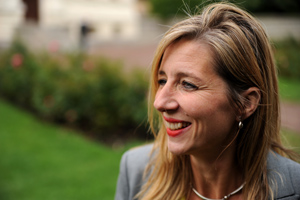Interview with Professor Annette Hill
What is this course about?
It is common in my area of research to say the concept of the ‘audience’ is in crisis. Certainly, the traditional notion of viewers sitting in front of the television has been replaced by much more varied models of dispersed and fragmented audiences, ‘users’, or ‘participants’. At the same time, audiences survive. Today’s diverse range of media forms continues to have audiences. We need to urgently find new ways of understanding audiences for today’s media environments. How is it taught?
This is a masterclass in media audiences, and as such it is my take on audiences in media and communication studies. The approach of this course is one that understands audiences as engaged in dynamic and creative practices. Such an approach is not located around any particular paradigm, or method, but is rather multidisciplinary and multimethod in its understanding of audience research. This is how I like to research and all of my key books on audiences look at how audiences engage with and reflect on the changing nature of contemporary media. What is unique about this course?
Media is so integrated into our everyday experience. There is this idea of connected lives, by Viviana Zelizer, an American scholar I really like. Connected lives perfectly sums up the intricate relations between people and the media. This Masters course is a chance to understand the relationships tensions, and problems that arise when we study the connected lives of people and their engagement with media. What is your latest book about?
I am working on a new book Reality TV: Key Ideas (Routledge 2014). This book tells the story of evolving audiences for a hybrid genre like reality TV, from the 1990s to now. It is a genre on the move, as reality TV changes from a broadcast model in the 1990s to a more participatory model across different content today. For all these changes, what you see from the audience research is an enduring fascination with the performance of the self in our everyday lives.
It is common in my area of research to say the concept of the ‘audience’ is in crisis. Certainly, the traditional notion of viewers sitting in front of the television has been replaced by much more varied models of dispersed and fragmented audiences, ‘users’, or ‘participants’. At the same time, audiences survive. Today’s diverse range of media forms continues to have audiences. We need to urgently find new ways of understanding audiences for today’s media environments. How is it taught?
This is a masterclass in media audiences, and as such it is my take on audiences in media and communication studies. The approach of this course is one that understands audiences as engaged in dynamic and creative practices. Such an approach is not located around any particular paradigm, or method, but is rather multidisciplinary and multimethod in its understanding of audience research. This is how I like to research and all of my key books on audiences look at how audiences engage with and reflect on the changing nature of contemporary media. What is unique about this course?
Media is so integrated into our everyday experience. There is this idea of connected lives, by Viviana Zelizer, an American scholar I really like. Connected lives perfectly sums up the intricate relations between people and the media. This Masters course is a chance to understand the relationships tensions, and problems that arise when we study the connected lives of people and their engagement with media. What is your latest book about?
I am working on a new book Reality TV: Key Ideas (Routledge 2014). This book tells the story of evolving audiences for a hybrid genre like reality TV, from the 1990s to now. It is a genre on the move, as reality TV changes from a broadcast model in the 1990s to a more participatory model across different content today. For all these changes, what you see from the audience research is an enduring fascination with the performance of the self in our everyday lives.

